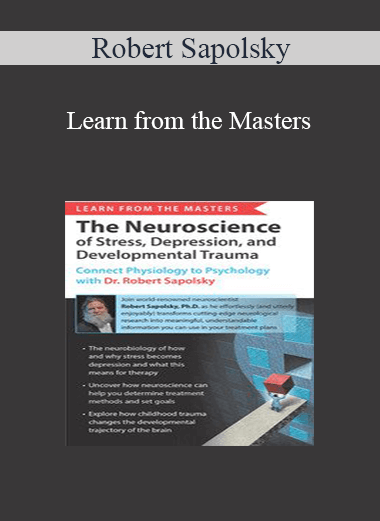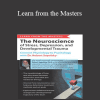Robert Sapolsky – Learn from the Masters: The Neuroscience of Stress, Depression and Developmental Trauma: Connect Physiology to Psychology with Dr. Robert Sapolsky
$119.99 Original price was: $119.99.$25.00Current price is: $25.00.
[Instant Download] – You will receive instant download access after the purchase
- Faculty:
- Robert Sapolsky
- Duration:
- 2 Hours 57 Minutes
- Format:
- Audio and Video
- Copyright:
- Apr 12, 2018
Description
| Manual (2.54 MB) | 33 Pages | Available after Purchase |
Outline
- What Does Biology Have to do With It?
- The Nature of Stress and the Stress Response
- The nature of stress
- Homeostasis
- The dichotomy between short-term and long-term stress exposure
- The stress response
- Hormones and autonomic pathways
- How the long-term stress response impacts the brain and body
- The Nature of Stress and the Stress Response
- Clinical Manifestations of Chronic Stress in Your Clients
- Impaired declarative memory
- Vulnerability to anxiety and fear conditioning
- Impaired executive functioning
- Impaired empathy
- The Interplay of Stress, Depression and
- Developmental Trauma
- The Neurochemistry and Neuroanatomy of Stress, Depression and Childhood Adversity
- How and why stress becomes depression
- Neurobiological mechanisms
- The psychological components of stress
- Learned helplessness as a model for depression
- Stress as a bridge linking the biological and psychological features of depression
- The genetics of affective resilience in the face of stress
- Childhood adversity as a risk factor
- How traumatic stress shifts the trajectory of brain development
- Clinical implications
- The Neurochemistry and Neuroanatomy of Stress, Depression and Childhood Adversity
- Connecting Biology to Psychology in Your Clinical Practice: An Interview with Dr. Jennifer Sweeton
- When is stress good?
- How can neurobiology help you to determine treatment methods and set goals?
- Coping with stress – social isolation vs. social affiliation
- Techniques that impact stress pathways, the stress response and the brains limbic regions
- Strategies to create resilient brains that are less susceptible to stress-based damage
- Gratitude interventions for stress and depression
Faculty
Robert Sapolsky, Ph.D. Related seminars and products: 1
Dr. Robert Sapolsky, Ph.D., is a MacArthur “Genius” Fellow, a professor of biology and neurology at Stanford University, and a research associate with the Institute of Primate Research at the National Museum of Kenya. In 2008, National Geographic & PBS aired an hour-long special on stress featuring Dr. Sapolsky and his research on the subject. In addition to A Primate’s Memoir, which won the 2001 Bay Area Book Reviewers Award in nonfiction, he has written three other books, including The Trouble with Testosterone, Why Zebras Don’t Get Ulcers, and Monkeyluv and Other Essays on our Lives as Animals. Dr. Sapolsky was awarded Rockefeller University’s Lewis Thomas Prize for Writing about Science for 2008. His articles have appeared in publications such as Discover and The New Yorker, and he writes a biweekly column for the Wall Street Journal entitled “Mind & Matter.” His new book is Behave: The Biology of Humans at Our Best and Worst (Penguin Press May 2017).
Speaker Disclosure:
Financial: Robert Sapolsky is a professor at Stanford University. He is a research associate at the National Museum of Kenya. Dr. Sapolsky receives a speaking honorarium from PESI, Inc.
Non-financial: Robert Sapolsky has no relevant non-financial relationship to disclose.
Delivery Method
– After your purchase, you’ll see a View your orders link which goes to the Downloads page. Here, you can download all the files associated with your order.
– Downloads are available once your payment is confirmed, we’ll also send you a download notification email separate from any transaction notification emails you receive from IMC.sale.
– Since it is a digital copy, our suggestion is to download and save it to your hard drive. In case the link is broken for any reason, please contact us and we will resend the new download link.
– If you cannot find the download link, please don’t worry about that. We will update and notify you as soon as possible at 8:00 AM – 8:00 PM (UTC+8).
Thank You For Shopping With Us!

![[Audio Download] EP85 Panel 01 - Schizophrenia - Bruno Bettelheim](https://imc.sale/wp-content/uploads/2022/02/Audio-Only-EP85-Panel-01-Schizophrenia-Bruno-Bettelheim-Ph.D.-Ronald-D.-Laing-M.D.-Thomas-S.-Szasz-M.D.-Carl-A.-Whitaker-M.D.-100x100.png)


![[Download Now] Robert Sapolsky - Learn from the Masters: The Neuroscience of Stress](https://imc.sale/wp-content/uploads/2022/02/Robert-Sapolsky-Learn-from.jpg)

6 reviews for Robert Sapolsky – Learn from the Masters: The Neuroscience of Stress, Depression and Developmental Trauma: Connect Physiology to Psychology with Dr. Robert Sapolsky
There are no reviews yet.